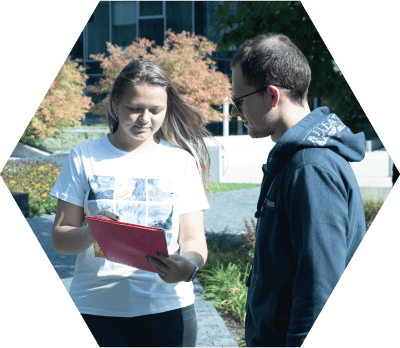
Phosphorus is an essential chemical element for our modern civilization. It is an indispensable component of many fertilizers and enables us to grow large amounts of crops to feed the growing human population. Unfortunately, large amounts of phosphorus end up getting washed out into surface waters. This causes excessive growth of cyanobacteria and results in a significant decrease of water quality and the destabilization of local ecosystems. Additionally, phosphorus is a finite resource. As phosphorus supplies are being depleted and water quality is declining rapidly, efforts are underway to find solutions to tackle these issues.
Find out more!

Luckily, we found a solution with the help of synthetic biology which we named PHOSCAGE. We engineered the bacterium Bacillus subtilis to sequester phosphates from its surroundings and into heterologous bacterial microcompartments (BMCs). The walls of BMCs allow small phosphates to pass through and once inside, they can be polymerized into large polyphosphates and therefore trapped. Considering that the production of BMCs is quite exhausting for the bacteria, we designed a novel gene regulatory system using phosphate concentration-dependent signalling pathway Pho and placed the expression of BMCs under its control.
Find out more!The best thing about PHOSCAGE is that it tackles two problems at the same time in a sustainable way. Engineered bacteria are efficiently capturing phosphates and simultaneously improving water quality and preventing eutrophication. Additionally, we aim to recycle the bacteria full of phosphates to be used in fertilizers and thus efficiently close the phosphorus loop. The bacteria can be enclosed in the form of biofilm which can be 3D bioprinted into a suitable shape inside a floating apparatus or a wastewater treatment tank. Biofilm forms a safe environment for the bacteria to thrive and it also prevents their escape into the environment.
Find out more!

Even though we faced many challenges on our way to creating PHOSCAGE, we obtained very promising and exciting results. We managed to follow the engineering cycle and were quite successful both in the wet lab and dry lab components of our project. We learned many things and we are looking forward to improving our system based on the knowledge we acquired.
We are a team of students from Masaryk University, Brno University of Technology and Comenius University. Our laboratory is located in Brno, Czech Republic and this is our second year participating in the iGEM competition. The distinctive feature of our team is that the initiative behind our establishment came solely from us students, and we have performed the majority of the tasks and organising related to our project independently. As a result, we have not only learned a great amount of organization, things in the field of synthetic biology but also became skilled in team finances, public relations and we became an independent unit functioning beyond the iGEM competition.
Find out more!

We are very well aware of the importance of open discussion with experts and the public in any scientific project. Therefore, we made sure to consult our ideas with experts, stakeholders and the general public and to implement their recommendations and feedback into the design of PHOSCAGE in a meaningful way.
We also focused on science popularisation in order to foster scientific thinking among people, since the fear of the unknown often leads to problems in today’s society. We created a broad collection of educational content, covering topics related to synthetic biology, science in general and technology. The highlight of our activities is the public lecture “GMO under the magnifying glass”, as well as our online courses. Our main goal is to inspire young people to engage in science and to have an open dialogue with the public.
Find out more!

Our team also aspired to excel in other areas related to synthetic biology. As citizens of Czech Republic and Slovakia, we are a part of the European Union. If we really want to change the world for the better with the help of science and technology, we have to be aware of the legislation regulating biosafety and the lawmaking process itself. Therefore, we decided to examine GMO regulations in the European Union in detail and to provide an overview of the current legislation and offer an outlook on future perspectives on synthetic biology in the EU.
This year's iGEM was a great challenge, especially due to the ongoing pandemic. We are however enormously proud of the work we have done on PHOSCAGE and we invite you to explore our WIKI!
Find out more!







































Igem Team Brno, Czech Republic 2021
